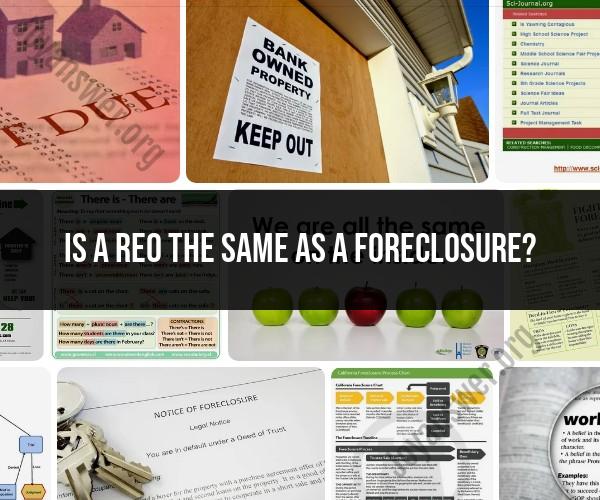Is a Reo the same as a foreclosure?
No, an REO (Real Estate Owned) property is not the same as a foreclosure, but they are closely related terms that are often associated with distressed properties in the real estate market. Here are the key differences between REO and foreclosure:
Foreclosure:
- Foreclosure Process: Foreclosure is a legal process through which a lender (usually a bank or mortgage lender) takes ownership of a property because the borrower (homeowner) has defaulted on their mortgage payments. The foreclosure process involves several stages, including a notice of default, a public auction (foreclosure sale), and a redemption period, during which the homeowner may have the opportunity to reclaim the property.
- Ownership Status: During the foreclosure process, the property is still owned by the homeowner until it is sold at a foreclosure auction or repossessed by the lender. The homeowner has legal rights and can potentially avoid losing the property through remedies like loan modification or selling the property before foreclosure.
- Sale at Auction: If the property is not reclaimed by the homeowner or sold before the foreclosure auction, it is typically sold at a public auction to the highest bidder. The buyer at the auction takes ownership of the property.
REO (Real Estate Owned):
- Ownership Status: An REO property, on the other hand, is a property that has completed the foreclosure process and is now owned by the lender, typically a bank. In other words, an REO property is a foreclosed property that did not sell at auction, so the lender becomes the owner.
- Lender-Owned: Once a property becomes an REO, the lender becomes responsible for maintaining and selling it. Lenders are typically not in the business of owning and managing properties, so they aim to sell REO properties to recoup their losses.
- Market Sale: REO properties are typically sold on the open market through a real estate agent or broker, similar to a traditional home sale. The lender may list the property for sale at market value or at a reduced price to facilitate a quicker sale.
- Clear Title: Lenders usually ensure that REO properties have clear titles, which means there are no outstanding liens or encumbrances on the property.
In summary, a foreclosure refers to the legal process that occurs when a homeowner defaults on their mortgage, leading to the potential loss of the property. An REO, on the other hand, is a property that has already gone through the foreclosure process and is now owned by the lender, who is actively trying to sell it on the open market. Essentially, all REO properties are foreclosed properties, but not all foreclosed properties become REOs; some may be sold at auction or resolved through other means before reaching REO status.
REO vs. Foreclosure: Understanding the Key Differences
REO (real estate owned) and foreclosure are two terms that are often used interchangeably, but they have different meanings.
Foreclosure is the legal process by which a lender takes possession of a property after the borrower defaults on their mortgage loan. Once the foreclosure process is complete, the lender owns the property and can sell it.
REO is a term used to describe a property that is owned by a lender after the foreclosure process. REO properties are often sold at a discount because the lender wants to sell them quickly.
Here is a table summarizing the key differences between REO and foreclosure:
| Characteristic | REO | Foreclosure |
|---|---|---|
| Ownership | Owned by lender | Owned by borrower until foreclosure process is complete |
| Status | Sold | Pending foreclosure |
| Timeline | Generally sold within a few months of foreclosure | Can take several months or even years to complete |
| Condition | Varies, but may be in need of repairs | Varies, but may be in disrepair |
Distressed Properties: Clarifying REO and Foreclosure Terminology
Distressed properties are properties that are in some way difficult to sell. This could include REO properties, foreclosures, short sales, and properties that are in need of major repairs.
REO properties are a type of distressed property, but not all distressed properties are REO properties. For example, a short sale is a property that is being sold for less than what is owed on the mortgage. Short sales are not foreclosures, but they are considered to be distressed properties.
Real Estate Owned (REO) Properties Explained
REO properties are properties that are owned by a lender after the foreclosure process. Lenders typically want to sell REO properties quickly so they can minimize their losses. As a result, REO properties are often sold at a discount.
REO properties can be a good option for homebuyers who are looking for a deal. However, it is important to be aware of the risks associated with buying an REO property. REO properties may be in need of repairs, and they may have liens against them.
If you are considering buying an REO property, it is important to work with a qualified real estate agent and lender who have experience with REO properties.
Here are some tips for buying an REO property:
- Get pre-approved for a mortgage before you start shopping for a home. This will give you an idea of how much you can afford to borrow and will make you a more competitive buyer.
- Work with a qualified real estate agent who has experience with REO properties. Your agent can help you to find REO properties and can negotiate on your behalf.
- Have the home inspected by a qualified inspector. This is important because REO properties may be in need of repairs.
- Be prepared to negotiate. REO sellers are often motivated to sell quickly, so you may be able to negotiate a good price on the home.
Buying an REO property can be a great way to get a good deal on a home. However, it is important to be aware of the risks involved and to work with qualified professionals.












